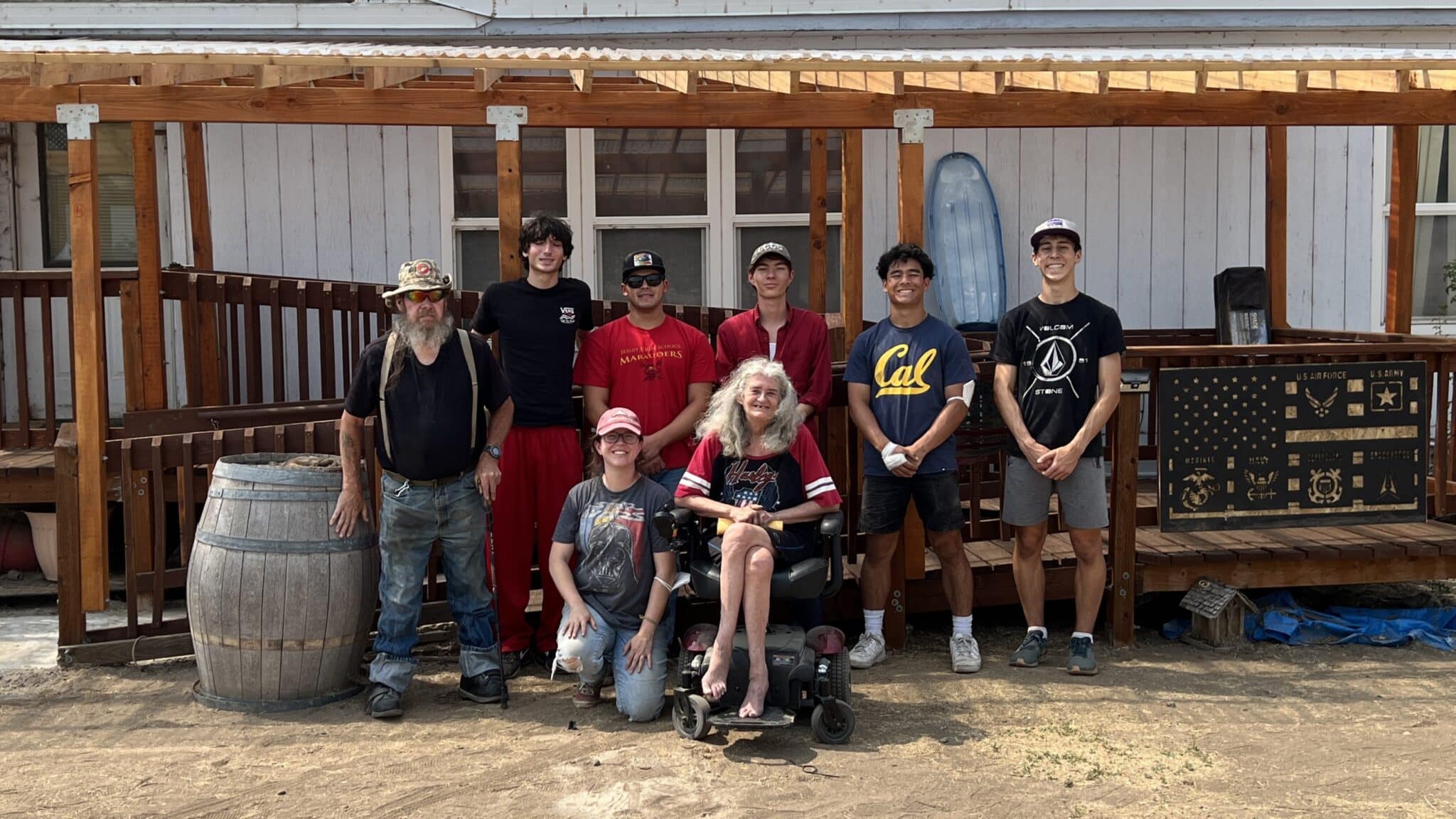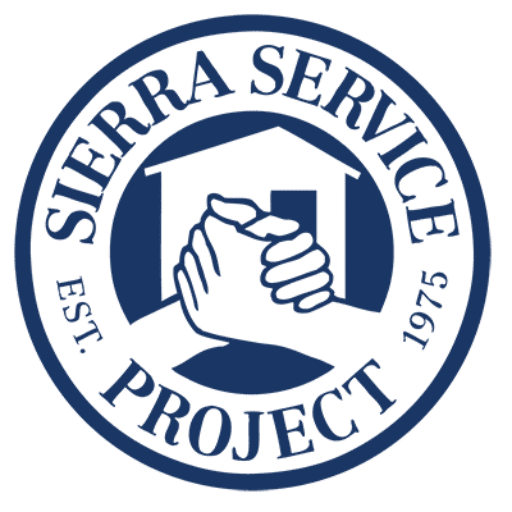
[vc_row][vc_column width="1/3"][vc_btn title="Summer Volunteer Weeks" style="gradient-custom" gradient_custom_color_1="#15bac2" gradient_custom_color_2="#004aad" shape="round" align="center" i_icon_fontawesome="fas fa-map-marked-alt" css="" add_icon="true" link="url:https%3A%2F%2Fwww.sierraserviceproject.org%2Fsummer%2F|title:Summer%20Service-Learning%20Weeks"][/vc_column][vc_column width="1/3"][vc_btn title="Read More: Chiloquin Connections" style="gradient-custom" gradient_custom_color_1="#15bac2" gradient_custom_color_2="#004aad" shape="round" align="center" i_icon_fontawesome="fas fa-handshake" css="" add_icon="true" link="url:https%3A%2F%2Fwww.sierraserviceproject.org%2Fchiloquinconnection%2F|title:Read%20More%3A%20Chiloquin%20Connections|target:_blank"][/vc_column][vc_column width="1/3"][vc_btn title="Get SSP's 2024 Newsletter in the Mail!" style="gradient-custom" gradient_custom_color_1="#15bac2" gradient_custom_color_2="#004aad" shape="round" align="center" i_icon_fontawesome="fas fa-envelope" css="" add_icon="true" link="url:https%3A%2F%2Fwww.sierraserviceproject.org%2Fnewsletter%2F|title:Get%20SSP's%202024%20Newsletter%20in%20the%20Mail!|target:_blank"][/vc_column][/vc_row][vc_row][vc_column][vc_column_text css=""][audio mp3="https://www.sierraserviceproject.org/wp-content/uploads/Interview-with-Wendy-Pat.mp3"][/audio]
Editor's Note: This blog is a transcript of a recorded interview between SSP's Executive Director Megan Taylor and Chiloquin residents Wendy and Pat Bernard in October of 2024. Click above to listen to this interview!
Megan: I know we have a couple of years of history of knowing each other. So, could you share how you first heard about SSP?
Wendy: I read about it in the Chiloquin newsletter, and I waited two years before I put in an application so that other people could get their stuff done, and then you all came out and did some work for us.
M: And that was, what, 2018?
W: Well, I read about it in 16, and you all did some work on it in 2018.
M: Yes, the fabulous wheelchair ramp. How has that ramp served you both in the past six years?
W: It's been absolutely awesome, hasn't it, babe?
Pat: Yes, it has. It's, it's so much easier for me to get up here, and I lost my leg in 2022. So being able to get up and down in a wheelchair, an actual honest-to-goodness wheelchair, was a lifesaver. I could get out to go see a doctor. I could back in again. That's the most important thing. It was just a wonderful addition to this house.
M: Remind, you're both veterans, is that right?
W: Pat's a veteran, I'm a Navy daughter and a Marine wife.
M: Closely connected then. Well, thank you for your service. Pat, I know Veterans Day is coming up here in a month or so. Well, tell me about your experience this summer, 2024, working with SSP staff and volunteers.
P: It was great. They were, they were wonderful. They were polite. Respectful, but friendly. They were good to have around!
W: I enjoyed every minute. I mean, if I came down with a question, they would answer it. If I came down with a concern, they would look at it and try to get it addressed. I would have taken any one of them into my home forever.
"I could get out to go see a doctor. I could back in again. That's the most important thing. It was just a wonderful addition to this house."
M: We all need extended grandparents, right? So tell me about the project that they completed for you both this summer.
W: They put up an awning over our ramp so that we didn't have snow falling off of the roof of our house onto the ramp that we'd pay to have it shoveled and 10 minutes later the snow would be back on the ramp. There was a couple times that we had to miss appointments because we couldn't get out.
M: That sounds really scary.
W: It was. This time we'll be able to get out in the wintertime when it snows.
M: Yes. I always think it's hard For us to remember in the summertime, how much it actually snows, because it feels so different. So it's a great reminder that there's real seasons, and winter is no joke.
W: Yeah, I'm glad I was able to share pictures of the situation with you beforehand.
M: Really gives it context.
P: So awful much, but the snow comes sliding down off the roof. And it, it hits the ramp perfectly.
M: Just pile makes a nice old pile right on the ramp?
P: Exactly. Hopefully not anymore. Hopefully not. We will see this winter.
M: Yes. We'll see. When do you all expect the first snow of the winter?
W: Anytime, actually.
M: Really this early? It's October.
W: We've had snow as early as the end of September and as late as July.
M: Now that I think of it, I have been in Chiloquin in April when it's been snowing. Don't want to have that to deal with that when you're getting in and out of your home. Well, I know there was the, is it the Copperfield fire that happened after we left this summer? Was it late August into September? Were you all impacted by that?
W: Not this time. We did watch closely. As to what was going on with the Copperfield fire because we didn't know the wind could have shifted at any time and we could have been in danger. But this year, unlike in 2020, where they had the 242 fire, we had to evacuate then, but we didn't have to evacuate this time.
M: Oh, I didn't realize that you've been evacuated in 2020 from that fire. It got that close?
W: Yeah, we know Chief Cook. And when he starts calling, he starts calling for everybody he can get his hands on, you know there's trouble.
M: I appreciate that he personally makes those calls. That's really valuable, glad to hear that. I know I was at your house this summer when the power went out because of a fire on the other side of Chiloquin Ridge. Being a city kid, I didn't really understand how that would happen and why that would happen, why the power would be down because of the, the fire nearby. Do you guys have any other stories that you want to tell about being impacted by the fires or the realities of living where you live?
W: Well, when we first moved up here, I didn't think anything about getting homeowner's insurance. They hadn't had any big fires until 2020. And after that, we spent 24 hours over at the travel center, sleeping in our vehicle, because they got us a room, but they didn't take cats and birds, so we had to go back. If we'd have had a dog, they'd have taken us. But when I got back, I decided, that was a little too close. Time to get insurance.
M: I mean, sometimes it takes those scary moments before we change, change our ways. It takes those hard moments. I'm glad. That was sort of a wake up call, I suppose.
W: But living out here in the country, everybody helps everybody. And we saw that.
M: Tell me more about that. How did you all help each other during that time?
W: People were donating hay, giving food, gathered up clothing and water and everything that, you know. Trailers and stuff like that. People were coming out of, uh, Keno and Bonanza saying, "Hey, I've got a four horse trailer or a stock trailer if you need to move livestock." And they were going in and evacuating everything they could get out of the path. So the people didn't lose their pets, their animals, and as much of their household belongings as they could get out. Everybody helps everybody here. It's awesome.
M: I love that. That makes the community really special, I think.
"Everybody helps everybody here, it's awesome."
W: Yes, it does. Well, are there It's just like being in North Carolina right now. Trailers of hay and stuff are leaving out of here, headed east, and our packed power crews, they sent 20 trucks and 22 personnel to the east coast.
M: Really? Wow. Yeah. I didn't know that. We have some SSP staff alumni and former board members who live out in Asheville, and, I think they're all okay, but it's been interesting to hear about their experience and also hearing how people come together in crisis to help one another. I think that's what makes community so special.
W: That happens a lot out here in Chiloquin. I mean, somebody has a problem, people rally. Our veterinarian, the Happy Pet Vet, she's part of the disaster relief. She will help go in and evacuate animals and treat animals that have been injured and stuff like that. Good old country living.
M: Yeah. Good old country living. That's right. Well, are there any other special moments or memories of working with SSP young people that you wanted to share?
W: We had several, I think it was last week in particular. They were swimmers and football players and stuff like that. And to give up their summers working out to work to work on improving their sports, they gave that up to come up and help people they didn't even know. And the joking and the stories, and asking life advice and stuff like that. They were really, really interested and wanted to know. And that's so uncommon in the young people today.
"It's been interesting to hear about their experience and also hearing how people come together in crisis to help one another. I think that's what makes community so special."
M: I love that you were able to witness that firsthand. It's easy to forget what people are giving up, to be there and the community that people bring with them.
W: And it's nice to see them come from the cities and come out to the country to see what it's really like out here. We raise cattle and grow crops that they'll eat in the grocery store.
M: I think that's so important to see what life is like outside your own bubble. You know, we can tell ourselves stories, but we don't really know until you're there. Until you meet people.
"It's nice to see them come from the cities and come out to the country to see what it's really like out here. We raise cattle and grow crops that they'll eat in the grocery store."
W: Yeah. My favorite part of the whole thing was in 18 when the kids went to Collier State Park and they planted trees, one that they named Chili after the kitty I lost last year on my birthday.
M: Oh, that is a really sweet story.
W: And then the 242 fire ripped through there. And I was wondering if The Chili Tree, as I call it, was still standing. And the week that Randy was here, they went over and Randy found where they had planted that tree, and that tree was still there, and he sent me a picture of it, which made me cry.
M: Oh my gosh, I need to ask him for that photo. I love that. That says something special is going on. Well, thank you so much for your time today and for chatting. I know I could talk to you guys forever. I appreciate being connected to you both and for you sharing part of your, your story with SSP.[/vc_column_text][/vc_column][/vc_row][vc_row][vc_column width="1/3"][vc_btn title="Summer Volunteer Weeks" style="gradient-custom" gradient_custom_color_1="#15bac2" gradient_custom_color_2="#004aad" shape="round" align="center" i_icon_fontawesome="fas fa-map-marked-alt" css="" add_icon="true" link="url:https%3A%2F%2Fwww.sierraserviceproject.org%2Fsummer%2F|title:Summer%20Service-Learning%20Weeks"][/vc_column][vc_column width="1/3"][vc_btn title="Read More: Chiloquin Connections" style="gradient-custom" gradient_custom_color_1="#15bac2" gradient_custom_color_2="#004aad" shape="round" align="center" i_icon_fontawesome="fas fa-handshake" css="" add_icon="true" link="url:https%3A%2F%2Fwww.sierraserviceproject.org%2Fchiloquinconnection%2F|title:Read%20More%3A%20Chiloquin%20Connections|target:_blank"][/vc_column][vc_column width="1/3"][vc_btn title="Get SSP's 2024 Newsletter in the Mail!" style="gradient-custom" gradient_custom_color_1="#15bac2" gradient_custom_color_2="#004aad" shape="round" align="center" i_icon_fontawesome="fas fa-envelope" css="" add_icon="true" link="url:https%3A%2F%2Fwww.sierraserviceproject.org%2Fnewsletter%2F|title:Get%20SSP's%202024%20Newsletter%20in%20the%20Mail!|target:_blank"][/vc_column][/vc_row]
